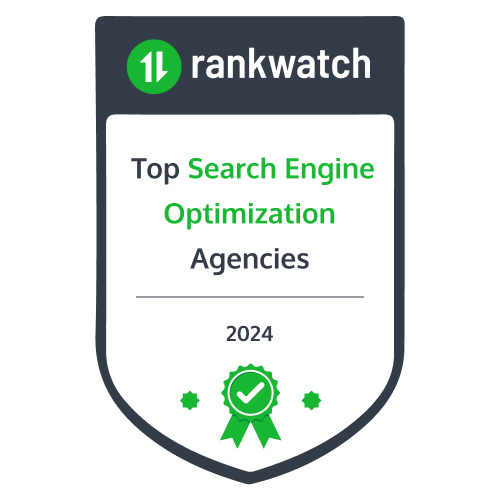How to Use Chat GPT to Optimize Your Customer Experience and Scale Up Your Processes
When ChatGPT launched in 2022, it quickly took the tech world by storm, transforming artificial intelligence (AI) from a niche technology into a mainstream tool.
Since then, industries of all kinds—from retail and finance to healthcare and education—have explored how ChatGPT could improve their business operations and the customer experience. With its advanced language capabilities and natural language processing (NLP), ChatGPT has opened up new possibilities for delivering efficient, human-like customer responses.
In this blog, we’ll explore how businesses can use ChatGPT to optimize customer service, boost customer satisfaction, and build stronger relationships.
How Does ChatGPT for Customer Service Work?
At its core, ChatGPT is a form of Generative AI (Gen AI), a technology that uses deep learning to produce human-like responses based on the data it’s been trained on. This type of AI works by analyzing vast amounts of historical data, allowing it to recognize patterns, understand context, and generate responses that feel human.
Businesses have primarily examined AI’s role in marketing. However, in the context of customer service, this technology enables businesses to handle a wide range of customer questions and provide accurate answers in real time.
AI models like ChatGPT can be trained on specific data relevant to a company, such as previous customer interactions, purchase history, common questions, or product information. This means that instead of generic responses, ChatGPT can offer relevant responses specific to the company’s products and services. These targeted responses improve the customer experience by providing accurate, brand-specific answers.
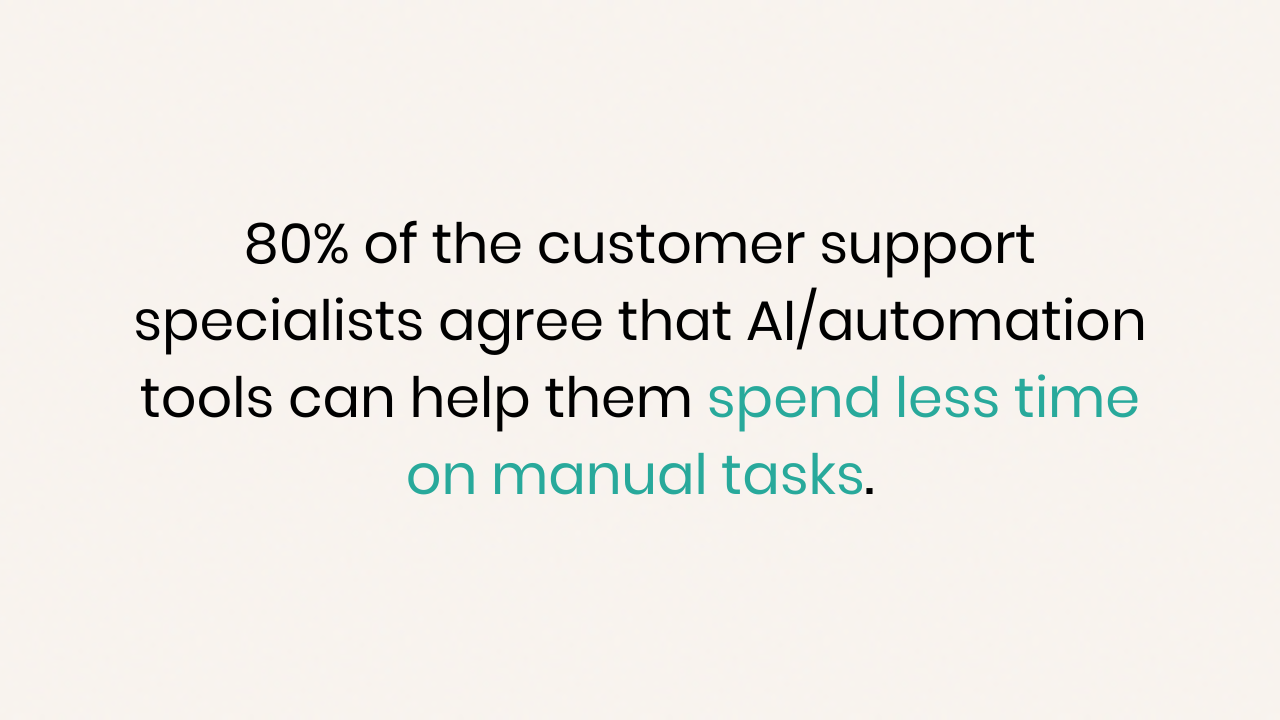
AI can handle the most frequently occurring product/delivery questions while sounding like a human representing your brand voice. (Image source.)
By training AI models on targeted data, businesses can ensure that ChatGPT aligns with their brand voice and customer expectations. Doing this enhances the efficiency and personalization of their customer service operations.
It also helps customer service teams quickly respond to routine questions, freeing human agents to focus on complex issues that require a personal touch. The result is a streamlined process where AI handles repetitive tasks. At the same time, human agents tackle more nuanced inquiries, creating a more seamless experience for customers and supporting long-term customer satisfaction.
Why Customer Service Matters
Businesses today face high expectations when it comes to customer service.
Customers want quick responses, personalized interactions, and accurate answers to their questions. ChatGPT offers a valuable tool for meeting these expectations by improving the customer experience across multiple touchpoints.
Poor customer service can lead to frustrated customers, negative reviews, and a damaged reputation that’s hard to repair.
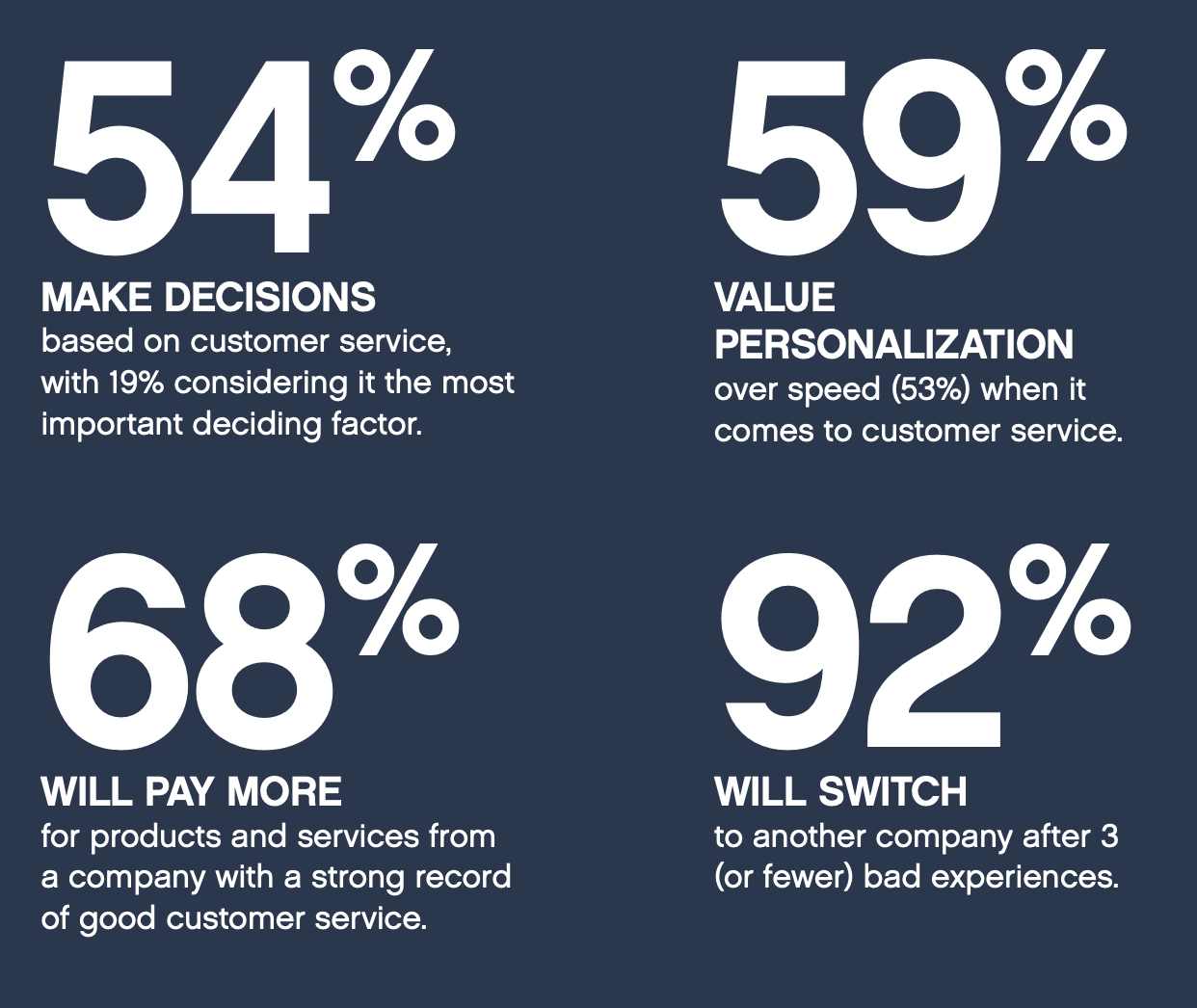
In case you didn’t know how crucial good customer service is. (Image source.)
When customers feel undervalued or ignored, they quickly switch to competitors who prioritize their needs, resulting in lost revenue and customer loyalty.
On the other hand, strong customer service is the cornerstone of business success. It builds trust, strengthens customer relationships, and drives long-term loyalty. Effective customer service creates positive experiences that make customers feel understood and valued, setting a business apart.
So, now that we’ve established the importance of customer service and ChatGPT’s potential impact in that arena, let’s examine specific use cases.
24/7 ‘Human’ Chatbots
Chatbots have long been used in customer service, but earlier versions were limited to rule-based interactions, meaning they could only respond to specific commands or keywords. This approach often led to a frustrating customer experience, as these bots couldn’t understand nuanced questions or offer relevant responses beyond pre-set answers.
Now, you can use tools like WhatsApp business, where a human interacts with customers on the go. You can also use AI-powered chatbots that have evolved to offer more sophisticated and human-like replies at incredibly short response times.
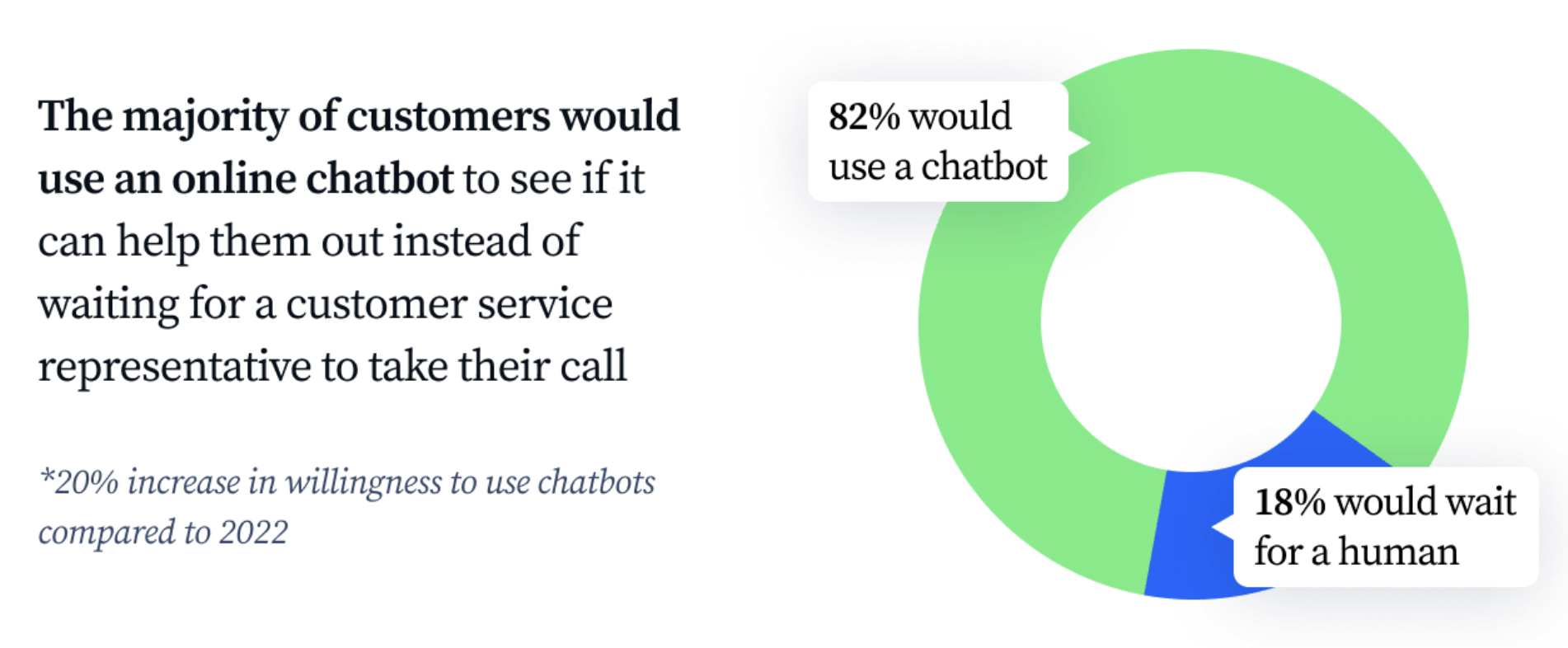
The modern user is more than happy to talk to a chatbot. (Image source.)
Using advanced NLP, AI-powered chatbots can understand and respond to various customer questions with accuracy and relevance.
For instance, if a customer asks about their recent order status, an AI-powered chatbot can access relevant data, track previous interactions, and provide an instant answer.
If a customer needs help troubleshooting a technical issue, the chatbot can offer detailed guidance and follow-up if the issue remains unresolved. This ability to handle complex tasks and tailor responses based on individual customer needs creates a seamless experience. It allows chatbots to resolve issues efficiently and reduce the workload on human agents.
ChatGPT-Powered Search Engines
An AI-powered search engine on a website offers a much more efficient and intuitive experience for customers than a traditional, non-AI search tool.
Unlike basic search engines that rely on exact keyword matches, AI-driven search engines use natural language understanding to interpret customer queries and return more relevant results.
For example, suppose a customer searches for a “blue waterproof jacket for hiking.” An AI-powered search engine can process the specific intent and suggest products matching color and function rather than displaying a broad range of jackets.
The fantastic thing about AI-enhanced search engines is that they can learn from previous interactions, recognizing patterns in customer behavior to refine results over time. This leads to faster, more accurate responses, helping customers find exactly what they’re looking for. It also improves overall satisfaction by creating a seamless browsing experience tailored to their needs.
Complaints Management
Even with the best customer service efforts, issues can arise, leading to customer complaints.
Managing these complaints efficiently is crucial for maintaining customer satisfaction and loyalty. AI can greatly optimize complaints management by quickly categorizing issues based on urgency and complexity, allowing customer service teams to prioritize cases appropriately.
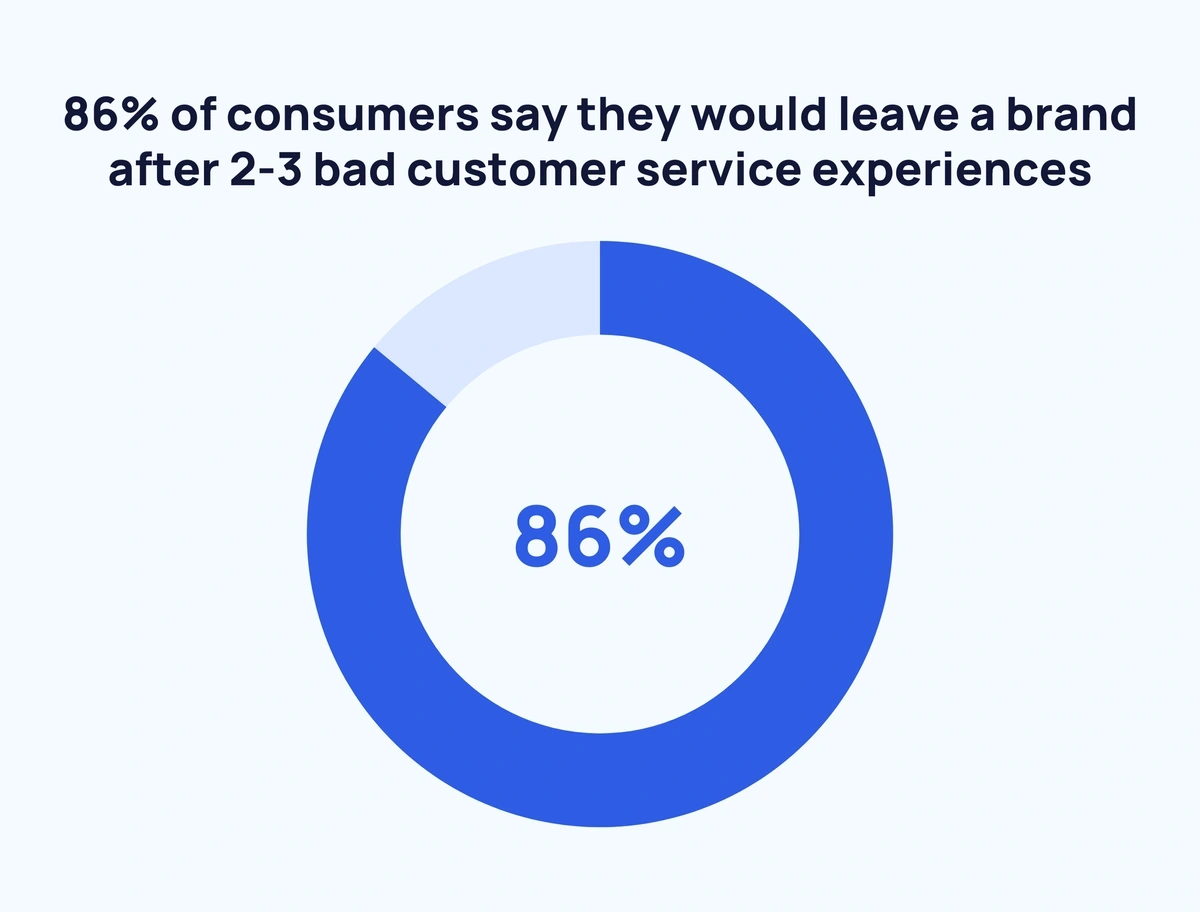
Customers are rarely forbearing with a lousy service. (Image source.)
For example, imagine a customer contacts support about a delayed shipment. An AI-powered system can automatically identify it as a time-sensitive issue and notify a human agent to handle it promptly.
AI can also analyze the tone of customer messages, detect frustration or urgency levels, and suggest personalized responses to diffuse tense situations—this is known as sentiment analytics.
This way, AI makes your customer base feel heard and valued, even when things go wrong, which is how you turn a potentially negative experience that could spiral into an opportunity for positive engagement.
Multilingual Support
The modern business serves a worldwide audience.
ChatGPT enhances customer support by offering multilingual assistance and delivering culturally appropriate responses. These important details broaden accessibility and improve the customer experience for a diverse audience.
An AI language model can quickly switch between languages, allowing businesses to communicate with customers in their preferred language without additional translation services. This capability is precious for global companies aiming to build trust with international customers.
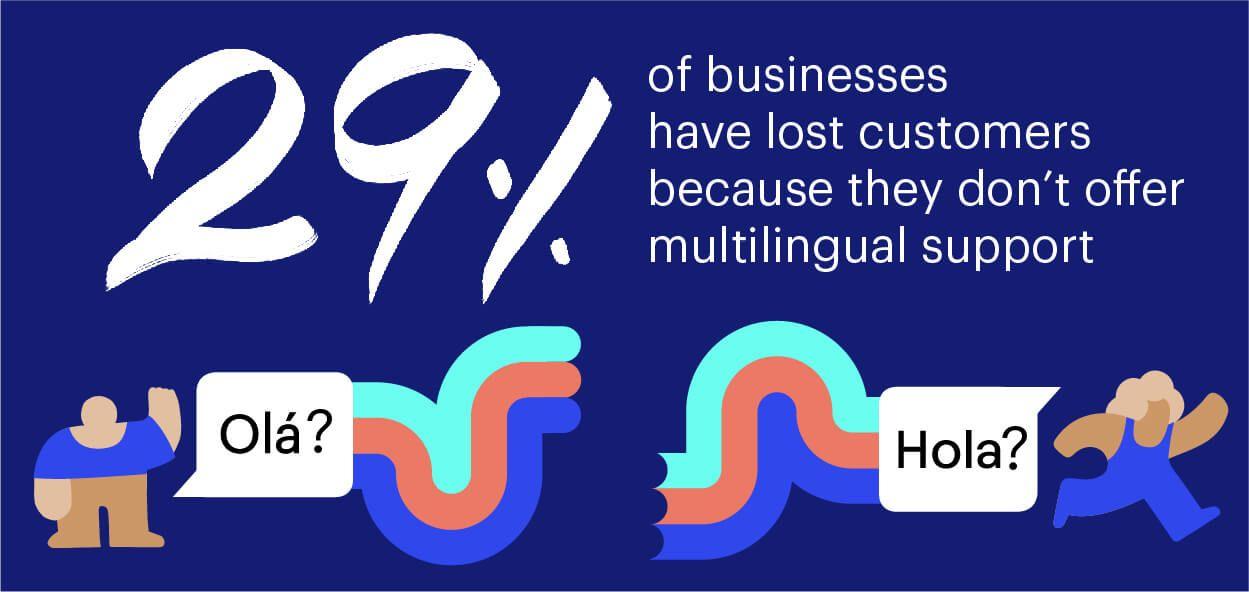
Multilingual support might have been complex pre-AI, but now there is little excuse. (Image source.)
A customer from Spain seeking assistance in Spanish or a user from Japan needing support in Japanese can receive accurate responses in their native language, removing potential language barriers.
Additionally, ChatGPT’s ability to incorporate culturally relevant details means it can adapt responses based on regional preferences or sensitivities. This feature ensures that customers from different backgrounds feel understood and respected during interactions.
When you provide support that resonates with customers on a linguistic and cultural level, you deliver an experience that exceeds customer expectations and feels genuinely personalized.
Task Automation
AI can automate many routine customer service tasks, allowing human agents to focus on complex, high-value interactions that require personal insight and empathy.
Tasks like handling frequently asked questions, processing order updates, and managing returns or refunds are ideal for automation.
If a customer wants to check their delivery status, an AI system can quickly access the order database and provide an instant update, sparing human agents from manually looking up this information.
Similarly, AI-powered tools can assist customers with resetting passwords or updating account information—repetitive tasks that are essential for customer satisfaction.
When businesses automate simple but critical routine tasks, they ensure fast, accurate responses. Automated responses also allow human agents to address nuanced issues, such as helping customers navigate technical problems or resolving complaints involving multiple departments. This balance between AI-handled tasks and human interaction helps optimize customer service operations and improves the overall customer experience.
Customer Service Analytics
ChatGPT can analyze vast amounts of past customer interactions, which is a form of market research, uncovering valuable patterns that help businesses improve service quality and responsiveness.
By examining common questions, concerns, and feedback, ChatGPT can identify recurring issues affecting customer satisfaction, such as frequent complaints about delivery delays or questions about product compatibility. This analysis enables customer service teams to address these concerns proactively. They do this by updating product descriptions to clarify details (which can improve website ranking) or improving the fulfillment process to reduce delays.
Recognizing patterns also allows businesses to refine training for customer service agents, ensuring they’re well-prepared for the issues customers are most likely to raise.
ChatGPT’s insights can guide the development of targeted FAQs and automated responses, empowering AI chatbots to handle common queries even more effectively. This data-driven approach helps businesses anticipate customer needs, delivering a smoother, more responsive customer experience.
Final Thoughts
Every business operates in a competitive market, making exceptional customer service essential to building lasting relationships and driving business success.
This blog has highlighted how AI tools like ChatGPT can transform user interactions by enhancing responsiveness, improving personalization, and supporting efficient service delivery.
By using AI solutions, businesses can streamline their customer service operations, freeing up human agents to focus on the tasks that matter most.
Embracing AI optimizes processes and elevates the entire customer experience to a new level, making it a powerful step toward sustained customer satisfaction.
About the author

Kelly Moser is the co-founder and editor at Home & Jet, a digital magazine for the modern era. She’s also the content manager at Login Lockdown, covering the latest trends in tech, business and security. Kelly is an expert in freelance writing and content marketing for SaaS, Fintech, and e-commerce startups.




